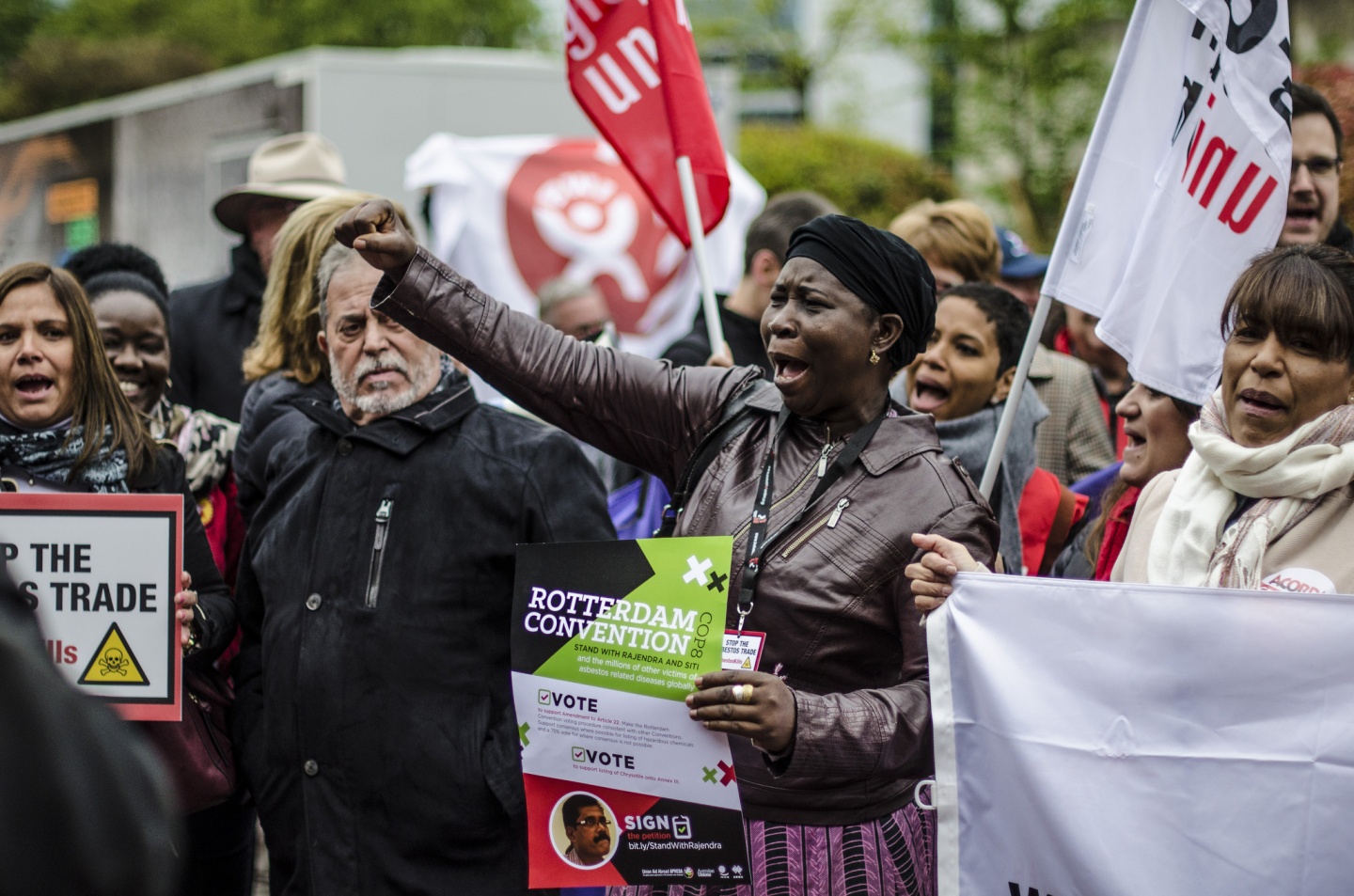3 May, 2017The Rotterdam Convention has been utterly discredited, says IndustriALL Global Union as chrysotile asbestos fails to be listed as a hazardous substance by the Convention for the sixth time.
The eighth Conference of Parties to the Rotterdam Convention, a United Nations treaty that requires dangerous substances listed by the Convention to be traded only with prior informed consent, is currently taking place in Geneva, Switzerland.
Today, 3 May, a small minority of countries with commercial interests in continued asbestos use, including India, Kazakhstan, Kyrgyzstan, Russia, Syria and Zimbabwe, blocked chrysotile from being listed on Annex III of the Convention. For a substance to be listed, parties must reach unanimity.
Chrysotile asbestos will not be considered for listing until the next COP in two years’ time. Russia even advocated taking chrysotile off the list of proposed chemicals for listing, a move not permitted under the Convention.
“Failure to list chrysotile asbestos on Annex III once again is an absolute disgrace. While they dither, hundreds of thousands of people will die from asbestos-related diseases,” said Andrew Dettmer, National President of IndustriALL affiliate, the Australian Manufacturing Workers’ Union (AMWU).
Chrysotile asbestos meets all the scientific criteria required for listing on Annex III and the majority of parties to the Convention support listing. Carolyn Vickers from the World Health Organization told the plenary:
“All forms of asbestos, including chrysotile, are carcinogenic to humans, and cause mesothelioma and cancer of the lung, larynx and ovary. The evidence that chrysotile is carcinogenic is conclusive and overwhelming, and it has continued to strengthen over time.” She added that it caused a serious threat to public health.
The representative from Uruguay said: “This issue is about human rights. Listing still allows you the right to produce a chemical and sell a chemical but we have a right to be informed, as an equal right. We need prior informed consent.”
In the meantime, the Parties are considering a proposal from a group of 12 African nations to amend Article 22 of the Convention, so that a substance can be listed with a 75 per cent majority of voting parties. A contact group during CoP8 has been formed to consider the proposal but workers’ groups have been excluded.
“People are more concerned about preserving a broken process than preventing more deaths. Failure to involve the voice of workers goes against any notion of transparency,” said Dettmer.
Asbestosis sufferer, Siti Kristina, worked in an asbestos textile factory in Indonesia. She told the meeting:
“I was exposed to asbestos in the factory for 23 years. If asbestos got under our clothes it was difficult to remove it. After ten years I started coughing. In 2010, I was diagnosed with asbestosis. I am just one and many of friends have been suffering.”
Speaking on behalf of IndustriALL, Frank O’Grady, from Australian union the CFMEU said: “Like most other workers in the construction industry, we were never informed of the dangers of asbestos. For those countries that oppose the listing of chrysotile, the signs, the practice and the reality show otherwise. At the very least, 130,000 workers dying annually from asbestos-related diseases says otherwise.”
A representative from the Pacific Islands said: “We have new chrysotile building materials on sale in the shops now. There is very low awareness of the dangers of asbestos. The threat of natural disasters, which are growing in terms of frequency and intensity, means our citizens are at risk. We need to know when chrysotile materials are being imported.”
Australia has some of the highest rates of mesothelioma in the world. A country representative told the plenary. “We have and continue to pay a high-price for using chrysotile asbestos.” An estimated 25,000 Australians are expected to die from asbestos-related diseases over next 40 years.
Andrew Dettmer, said: “The asbestos awareness campaign we have supported in South East Asia has helped bring countries like Vietnam, Laos and Indonesia into the support listing chrysotile camp. Reform of the Rotterdam Convention is now a live, international issue.”
IndustriALL’s director for health, safety and sustainability, Brian Kohler, said:
“The Rotterdam Convention is broken. Enough is enough. For the Convention to be effective, it must stop allowing the financial interests of a few powerful oligarchs to threaten the lives of millions. It’s a shameful example of a dysfunctional system and a discredit to the entire United Nations system. How many hundreds of thousands of people must die from asbestos-related diseases before the parties to the Rotterdam Convention change this?”



